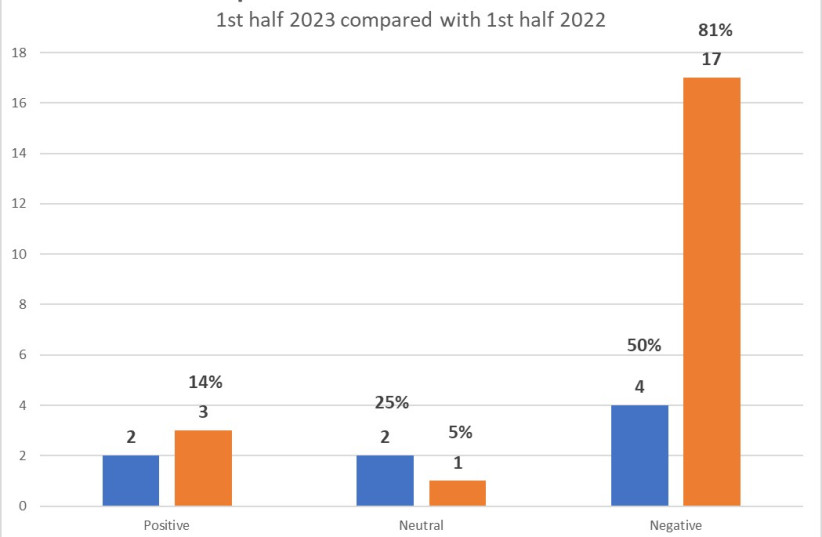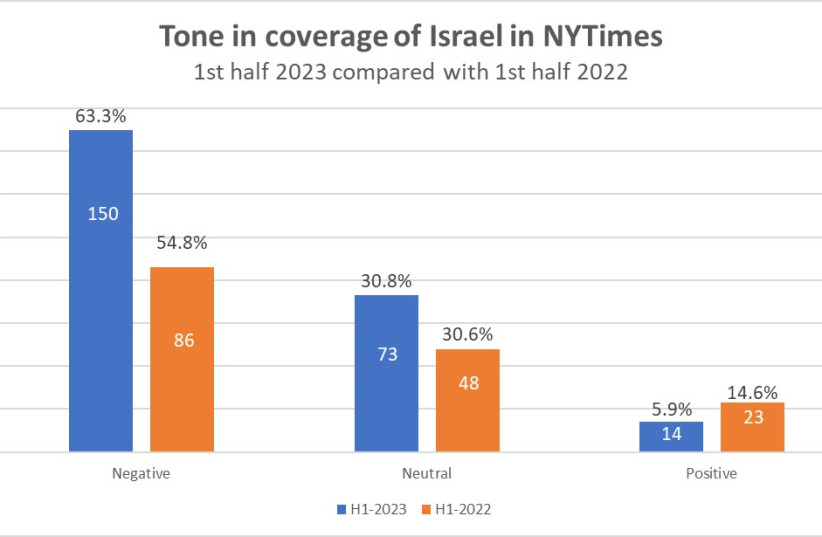If you want the bottom line from comparing the coverage of Israel in the "New York Times" in the first half of 2023, with the first half of 2022, this would be it: A “fully right-wing” government is extremely bad for 'hasbara'. It may sound trivial and unimportant, since 'hasbara' is a slightly outdated term, but the ramifications are far-reaching.
Hasbara is actually public diplomacy, and public diplomacy is critical. If simplified, then the American media influences public opinion, the public then elects its representatives to Congress and Senate, and those elected decide whether to keep arming Iron Dome.
So, when Israel's public diplomacy is deficient, there is less legitimacy for military actions, even when we are on the right side of the conflict. When Israel's public diplomacy is bad, it affects our ability to influence fateful matters, such as the global reaction to Iran's nuclear program.
When Israel's public diplomacy is lacking, we suffer the cold shoulder from our Arab friends as well. Years of hard work led to deep cooperation with Egypt as well as important cooperation with Jordan and excellent ties with the UE. However, when the “fully right” government waves towards the electoral base by building settlements and erasing Hawara, no one in the Arab world can ignore it. It also threatens the important plans vis-à-vis Saudi Arabia.
Unsurprisingly, "The New York Times" coverage of Israel was nasty in the first quarter of 2023. The country had never experienced such internal strife, and accordingly, the "Times" coverage was very intense and very negative. When events peaked in March, there were 82 articles about Israel in a single month, of which 66% were negative.
Out of 148 articles published about Israel in the first quarter, 67% were negative, and only 4.7% were positive (the remaining 28.3% were neutral).

During the second quarter, when legislation was delayed and discussions began at the President's residence, coverage became more moderate. The scope of coverage dropped by 66% to a total of 89 articles about Israel, of which "only" 57% were negative. 8% were positive and 35% were neutral.
When comparing the "Times" coverage of Israel in the first half of 2023 with the first half of 2022, the discrepancy is huge. The number of negative articles leaped from 86 in the first half of 2022 to 150 in the first half of 2023, a sharp increase of 75%. The articles presenting Israel in a more favorable light shrunk from 23 to only 14, a decrease of 40%.
The "New York Times" coverage of Israel was hostile and negative during 2022, but it turns out it can be much worse. 80% of the op-eds about Israel during the first half of 2023 were negative, and the amount of op-eds on Israel had leaped by 350%. In the first half of 2023, there were 21 op-eds about Israel, 17 of which were negative. In the first half of 2022, there were only 6 op-eds about Israel, and 4 were negative.
The differences between the current coverage and the coverage during the unity government, are highly significant. The attitude towards Israel was negative last year and reporting was selective and biased, but the overall coverage was a lot less voluminous. We simply drew a lot less fire. Perhaps this should also be one of Israel's public diplomacy main goals – to try to be a less central subject, less spoken about, and less within the polarized political disputes. Unfortunately, the current government is doing exactly the opposite.
A service to terror organizations
The Jenin Operation was covered extensively by the Western media, with one word missing from the headlines: terror. At best, the Palestinians were described as armed or militants. At worst, they were simply called "Palestinians".
The IDF's efforts to distinguish between armed militias and uninvolved parties are barely recognized by the Western press. They see Israel as a strong occupier, thus guilty in every situation, while Palestinians are victims whose leaders receive no criticism whatsoever.
The framing is simplified. It doesn’t distinguish between the Palestinians and their leadership, which has proved its corruption in every possible way over the past 30 years. It therefore serves only the terror organizations, who ride on the misery of their own people.
Public diplomacy has been utterly abandoned by Israel for over a decade, and during this time the twisted framing has become automatic for too many journalists. It was always difficult to convince the Western world that the conflict is bilateral, but the situation deteriorated due to neglect.
The current extreme and religious government is only making things worse. Between the wild settler riots and the dark comments about the LGBTQ community, the government is still under the illusion that it can relay to the world a liberal, peace-loving image of Israel.
Right after the Jenin operation, the "Times" published a long article headed "Young Palestinians drawn into the struggle against Israel are writing farewell messages to their loved ones". This was the chosen description for a culture which encourages its young to become suicidal terrorists, while blaming Israel for all their troubles.

Such a twisted display of reality is embarrassing, messed up, and should definitely be protested, but in an intelligent and professional manner. In the end, the government is more than a bunch of social media trolls and complaints cannot substitute actual action. The government must manage the country's public diplomacy, but it is light years away from comprehending its job.
Erdan’s Success
In the wake of headlines about this 2022 research in cooperation with Prof. Eytan Gilboa of Bar Ilan University, Israel's ambassador to the United Nations Gilad Erdan, sent a furious letter to the editor-in-chief of the "Times". He rightly claimed that this sort of coverage clearly contributes to hatred of Israel and to antisemitism, and set up a meeting with the paper's senior editorial staff.
He left the meeting frustrated; the editors claimed that the negative tone was subjective and that in their opinion they were not negative. Their excuse for the obsessive coverage was the response to a "hunger for stories about Israel” that they identified among their readers.
The editorial board's disconnect from the basic understanding that a hunger for negative stories about Israel is at some level anti-Semitic, is infuriating. Nonetheless, the meeting itself was important, as the process of changing an approach is long and exhausting. Particularly after the issue had been neglected for so many years.
The meeting may not have been easy, but according to the data of the first half of 2023 (and deducting the fact that the new government has drawn unprecedented fire due to the legal reform), it's clear that at least some of Erdan's message sunk in.
One of the 2022 study's clearest findings indicated the paper's disregard for terror organizations, who were simply not covered all year, as though they didn't exist. Coverage of the terrorist organizations in 2023 was still far from reflecting reality, but nonetheless, it’s possible to identify a slight improvement.
Hamas, for example, was mentioned in the first half of 2023 twice as much as in the first half of 2022, and Islamic Jihad was mentioned three times as much. Hamas was also mentioned in a number of subtitles, some regarding the Israeli hostages it is holding, and some regarding its praise for terror attacks; something that was never done in 2022. It may sound obvious, but the perception of Israel in the “Times” is at an extremely low point, and it will take a lot of hard work to change this.
When the editorial board is confronted with clear complaints due to clear numbers, it's hard to argue. Even if the change is much smaller than we'd like, it's important to continue monitoring the coverage. It’s the only way to achieve long-term change: not through a zero-sum game of who is "for us" or "against us", but rather continual, professional work to monitor illogical coverage, pointing out the media's errors in order to create change.
No good way to explain
Israelis have become somewhat indifferent to how Israel is perceived, due to the internal struggles which are consuming all the attention. Apart from that, the current government seems to assume that the international media hates us anyway, so there’s no point in paying any attention to it. The numbers, however, indicate a definite reason to pay attention.
The new ministers, such as Amichai Chikli and Galit Distel Atbaryan, appear confused. They gladly adopted the rhetoric labeling anyone who is against the government as a member of the despicable left, and they think they can use it in the diaspora as well. This utter lack of understanding is a disaster – these tones only serve to worsen Israel's problematic image.
The press Israel received during the Jenin operation was particularly horrid, and the "Financial Times" even called for a boycott of the settlements. Our public diplomacy is bleeding and the little that ministers are doing is simply to chat with their own base. But outside of the electoral base they are a herd of elephants in a china shop. It’s incomprehensible that anyone in the government still believes that this harmful rhetoric will bear any decent fruit.
The bottom line is – Netanyahu’s declarations that the legislation is good for democracy are futile. There is no good way to explain what has been going on here lately. When accused criminals are the ones changing the laws, it doesn't look good. When pictures of protesters being trampled by horses are posted on social media, it looks more like Iran, less like a democracy. As the government clashes with hundreds of thousands who oppose the legislation, calling them "anarchists" and "terrorists", it sounds like Putin addressing Ukraine.
Through its consistent refusal to reach a consensus, the government is shattering Israeli solidarity. This too has a negative effect because good PR depends on solidarity. In the end, we are all PR ambassadors for our country. We all need to tell our mutual story to ourselves and to the world, and when we're divided and polarized, it weakens our narrative.
